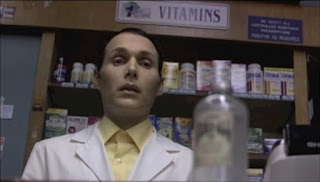Landscape After Battle (Andrzej Wajda, 1970, Poland)
Landscape After Battle is one of Wajda’s greatest efforts, a film where his historical, philosophical, and personal ambitions mesh. Based on stories by wartime writer and former Auschwitz prisoner Tadeusz Borowski, Battle tells the story of Tadeusz, a recently released POW whose life is now in the limbo in a displaced persons camp in Germany. As he describes the situation - “still detention: neither prison nor freedom”. Tadeusz is played by Daniel Olbrychski, who is a classic Wajda protagonist - plagued by doubt, wrestling endlessly with internal struggle. Tadeusz is an outsider at the camp - constantly carrying a stack of books in his arms, his fellow prisoners look at him with disdain. It should be noted that the opening of the film - a montage showing the liberation of the POWs, and their subsequent revenge on their captors, is one of the greatest openings in Wajda’s canon. Set to Vivaldi’s “Autumn”, it captures the jubilation and chaos of the moment.
While in the camp, Tadeusz meets a Jewish woman, Nina. Nina also expresses this state of limbo - she identifies neither as a Pole or a Jew. She yearns to escape Poland and go to the West to study. She can’t comprehend Tadeusz’s attachment to Poland - as she tells him “You’re not a person, you’re just a Pole!” The questions the film raises about Polish nationalism, Jewish identity, and emigration must have seemed particularly relevant in 1970, when the wounds of the 1968 Polish political crisis and anti-Jewish campaign, in which many of the country’s remaining Jews migrated to the West or Israel.
The courtship between Tadeusz and Nina is one of the highlight’s of Wajda’s filmography. Bathed in beautiful golden sunlight, the couple briefly escapes the camp and roams through the autumnal landscape. Wajda shows his painterly side, capturing beautiful orange and red hues.
9/10



Comments
Post a Comment